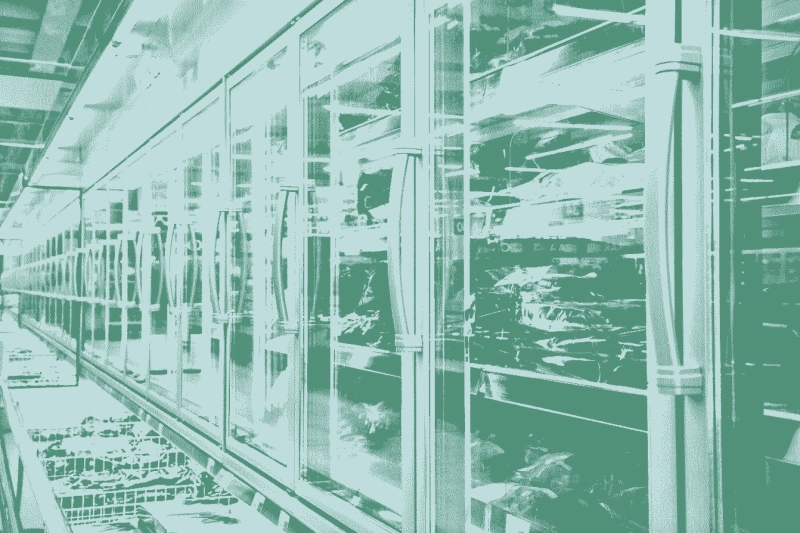In the retail food industry, particularly within grocery stores, the role of commercial refrigeration cannot be overstated. These cooling systems are not just about preserving food; they\'re central to maintaining food safety, ensuring customer satisfaction, and managing operational costs effectively. Given the critical importance of refrigeration systems, ensuring their optimal performance is a top priority for grocery store managers and owners.
This post delves into the significance of commercial refrigeration in grocery stores and outlines strategies to guarantee these systems operate at their best.
The Significance of Commercial Refrigeration in Grocery Stores

Commercial refrigeration systems serve a dual purpose in grocery stores: preserving the quality of perishable goods and presenting these items appealingly to customers. From fresh produce and dairy products to frozen foods and floral displays, refrigeration units keep items at safe temperatures, slowing the proliferation of bacteria and extending shelf life. The reliability of these systems directly impacts a store\'s ability to offer fresh, high-quality products, influencing customer trust and repeat business.
Moreover, refrigeration is among the highest energy consumers in grocery stores, accounting for a substantial portion of operational costs. Optimizing the performance of these units not only contributes to energy efficiency and cost savings but also supports sustainability efforts, a growing concern among consumers.
Strategies for Ensuring Optimal Refrigeration Performance

Regular Maintenance and Inspections

Routine maintenance is the cornerstone of optimal refrigeration performance. Establishing a regular schedule for professional inspections can help identify and rectify potential issues before they escalate into major problems. Key maintenance tasks include:
Cleaning Coils and Fans: Dirt and debris reduce efficiency and strain the system.
Checking and Sealing Gaskets: Ensuring doors seal properly to prevent cold air from escaping.
Verifying Temperature and Calibration Settings: Regular checks ensure temperatures are consistent and accurate.
Inspecting Refrigerant Levels: Proper levels are crucial for efficient operation.
Invest in High-Quality Equipment
Investing in high-quality refrigeration equipment from reputable manufacturers can enhance reliability, efficiency, and longevity. Modern units often come with advanced features such as energy-saving modes, improved insulation, and smart temperature controls, which contribute to better performance and reduced operational costs.
Smart Organization of Products
How products are organized within refrigeration units can significantly affect performance. Avoid overstocking, which can restrict airflow and lead to uneven cooling. Ensure there\'s enough space around products to allow for optimal air circulation. Proper organization also involves placing products in the appropriate sections to maintain ideal temperatures for different types of food.
Utilize Energy Management Systems
Advanced energy management systems (EMS) can play a pivotal role in optimizing refrigeration performance. These systems monitor the operation of refrigeration units in real-time, adjusting temperatures and defrost cycles for efficiency and longevity. EMS can also identify irregularities that may indicate potential issues, allowing for proactive maintenance.
Train Staff on Best Practices
Staff training is essential for maintaining optimal refrigeration performance. Employees should be knowledgeable about basic maintenance tasks they can perform, such as regular cleaning and checking door seals. They should also be trained on the proper loading of products and the importance of promptly addressing any signs of malfunction.
Retrofit and Modernize Older Systems
For grocery stores operating with older refrigeration units, retrofitting can be a cost-effective way to improve performance. This may include upgrading components like motors, compressors, and lighting to more efficient versions. In some cases, modernizing entire systems may be necessary to take advantage of the latest in refrigeration technology.
Implement Preventive Measures
Preventive measures such as installing night covers on open cases and employing strip curtains in walk-in coolers can significantly reduce energy consumption. These simple solutions help maintain consistent temperatures, reduce the workload on refrigeration units, and contribute to energy savings.
Monitor and Respond to Environmental Conditions
Environmental conditions within the store, such as ambient temperature and humidity, can impact refrigeration performance. Strategies to mitigate these effects include optimizing store layout to minimize exposure of refrigeration units to direct sunlight and managing store humidity levels to prevent excess moisture from affecting the systems.
The Role of Professional Services
While in-house staff can handle daily monitoring and basic maintenance, professional refrigeration services are vital for comprehensive maintenance, emergency repairs, and system upgrades. These experts offer valuable insights into enhancing efficiency, prolonging equipment lifespan, and ensuring compliance with food safety standards. Their expertise provides peace of mind and reliable support for critical refrigeration needs, allowing businesses to focus on core operations without worrying about refrigeration issues. With their assistance, businesses can maximize the performance of their refrigeration systems, minimize downtime, and maintain optimal conditions for storing perishable goods, ultimately enhancing customer satisfaction and business success.
Final Thoughts

Optimal refrigeration performance in grocery stores is a multifaceted endeavor that requires attention to equipment quality, regular maintenance, and operational best practices. By investing in high-quality refrigeration solutions, committing to regular maintenance schedules, and employing energy-efficient strategies, grocery stores can ensure their refrigeration systems operate at their best. This not only supports food safety and quality but also enhances customer satisfaction, reduces operational costs, and contributes to environmental sustainability.
Ensure Smooth Operations in Your Grocery Store with Refrigeration Maintenance and Repair from Airplus Refrigeration
Keep your grocery store running efficiently with Airplus Refrigeration. Specializing in commercial refrigeration repair service, including Norlake cooler freezer repair, walk-in cooler repair, and commercial freezer repair in Los Angeles, they are your go-to for reliable refrigeration maintenance. From ice machine rentals for every need to comprehensive commercial ice machine repair and installation, ensure your perishables stay fresh. Trust Airplus Refrigeration for all commercial air conditioning and refrigeration needs. Contact now.
About the Author
Jake Morrison is a seasoned refrigeration expert with over a decade of experience in optimizing commercial cooling systems for grocery stores. He shares actionable insights to improve efficiency and performance.


